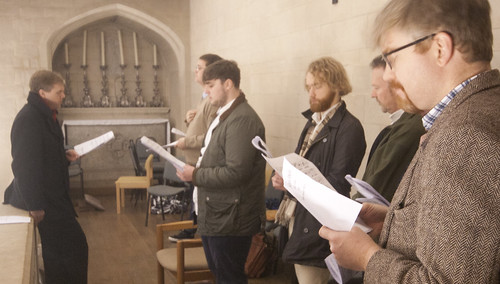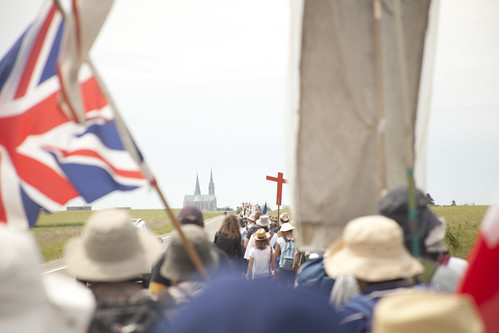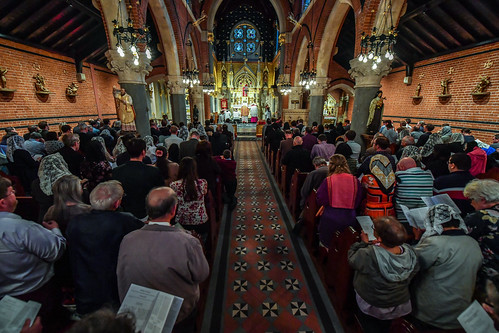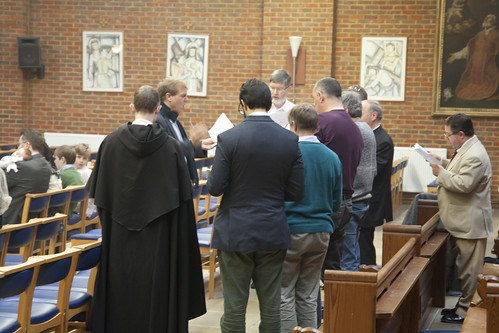Chairman's Blog
Singing and the Coronavirus
 |
| The Schola Abelis, Oxford's Gregorian Chant Schola, shrouded in incence in the rather roomy 'tribune' (choir loft) at Blackfiars back in 2018. |
Some potentially good news: there is now some evidence that the idea that singing is a specially dangerous activity in the context of the pandemic is false.
At the outbreak of the pandemic very little relevant research existed, but some has now been done: this paper, awaiting its peer-review, is at least a hopeful sign.
One of its key points is that singing does not spread air--and therefore anything carried by air such as viruses riding on droplets of water--very far:
The experiments clearly show that air is only set in motion in the immediate vicinity of the mouth when singing. In the case of the professional singer, the experiments showed that at a distance of around 0.5 m, almost no air movement can be detected, regardless of how loud the sound was and what pitch was sung. It is therefore unlikely that the virus could spread beyond this limit via the air flow created during singing. Amateur musicians who do not use the diaphragmatic breathing most commonly used by professionals when singing, but rather the natural chest breathing, do not get beyond this range either. By singing a very loud and long sequence of the same tone at about 2 Hz, a slightly wider spread of air movement could be achieved.
From: "Singing in choirs and making music with wind instruments ‒ Is that safe during the SARS-CoV-2 pandemic?" by Christian J. Kähler (Prof. Dr.) and Rainer Hain (Dr.) Institute of Fluid Mechanics and Aerodynamics, University of the Bundeswehr Munich, Werner-Heisenberg-Weg 39, 85577 Neubiberg, Germany.
The hope is that the issue with choirs will be social distancing, contrary to the cramped conditions many choirs frequently have to endure both in rehearsal and performance, but not the act of singing itself.
Marriage to end in the UK: with a wimper
Support the Latin Mass Society
Cardinal Koch and the amalgamation of rites
| An Altar Missal defaced to keep it up to date with the liturgical changes of the 1960s |
Cardinal Kurt Koch has taken up an idea which floats into the Catholic press every now and then, that the Extraordinary Form should be merged somehow with the Ordinary Form. Here in German, quoting the Cardinal at the end. The money quote (thanks to Google Translate) is
'The Eucharist is the central celebration of the unity of the church. It cannot have this meaning
when there is argument and confrontation around them.'
In that case, perhaps the extremists among the liturgical progressives should stop attacking the EF's right to exist. If they can't do that, I can't see them rallying around a rite which is a 'synthesis' of the two, and the conflict would continue: as it does, indeed, in practically every diocese and religious community where only the Ordinary Form is celebrated.
I followed this up with another piece on this blog which can be found here.
Remembering the Chartres Pilgrimage
 |
| The British Chapter in sight of Chartres Cathedral, in 2014 |
The Chartres Pilgrimage would in normal circumstances have taken place this weekend. I should be able to make it next year. We must make it a year to remember!
And don't forget: with a bit of luck we should be able to have the Walsingham Pilgrimage this year. Book here.
My latest on LifeSite.
Even fake 'water pistol baptisms' are disedifying
 |
| A very un-socially-distanced baptism, back in the days of innocence. The priest annoints the candidate. |
My latest on LifeSite.
The Anglican Bishops aren't having a good crisis
My latest on LifeSite.
The mysterious teaching union that doesn't want to teach
My latest on LifeSite.
Support the Latin Mass Society
Another chat with Fr McTeague: On Criticising Fellow Catholics
 |
| Spot the sinner! Can you see him? If there is one there, clearly this is no place for respectable Catholics. Cardinal Burke celebrates Mass in Corpus Christi Maiden Lane, London. |
Last evening I was interviewed again for The Catholic Current, a radio show hosted by Fr Robert McTeague SJ (a good one).
Our theme was an article I posted on Rorate Caeli and here, 'On Criticising Fellow Catholics'.
As regular readers will know I'm not against criticising people. My specific concern was the tendency on social media to divide Catholics into segments according to their views or preferred liturgy, and to make catty generalisations about them on the basis of isolated personal experiences: most often taking the form 'I went to that Mass once, and I felt uncomfortable because of what someone said to me afterwards'.
An important point here is that obviously there are sinners in the congregation and obviously the clergy and others should not chuck them into the street for breaking 'message discipline': nor yet lock them in the broom cupboard whenever a potential new recruit hoves into view.
You can listen to our chat here:
Spare a thought for Church musicians
 |
| A professional singer, Dominic Bevan (facing right), leading a training choir during the Latin Mass Society's Chant Training Weekend in 2019. |
The excellent article on church music by Matthew Schellhorn in the new Catholic Herald, who among other things is the Latin Mass Society's London Director of Music, prompted me to write on a related subject for LifeSite.
----------
DIY First Holy Communion in Ireland
The parents of ten pupils took up the offer of a virtual Communion. It gave me a real sense of what the early Catholic church must have been like, when people gathered for mass in each other’s homes.
Support the Latin Mass Society
